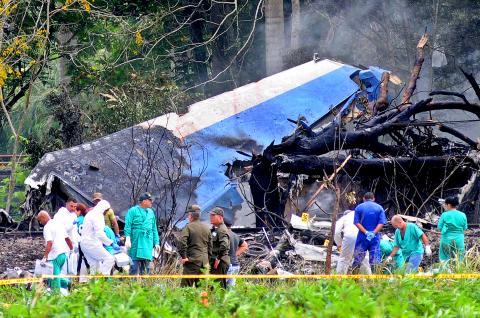Cuba yesterday began two days of national mourning for victims of a crash of a state airways aircraft that killed all but three of its 110 passengers and crew.
Cuban President Miguel Diaz-Canel said an investigation is under way into Friday’s crash of the nearly 40-year-old Boeing 737, leased to national carrier Cubana de Aviacion by a Mexican company.
Three women pulled alive from the mangled wreckage are the only known survivors.

Photo: EPA-EFE
The aircraft crashed shortly after taking off from Jose Marti International Airport, going down in a field near the airport and sending a thick column of acrid smoke into the air.
The mourning period is to last until midnight today, Cuban Communist Party leader and former Cuban president Raul Castro said.
Flags are to be flown at half-mast throughout the country.
The airplane was on an internal flight from Havana to the eastern city of Holguin. Most of the passengers were Cuban, with five foreigners, including two Argentines, among them.
The aircraft — carrying 104 passengers — was almost completely destroyed in the crash and subsequent fire. Firefighters raced to the scene to put out the blaze along with a fleet of ambulances to assist any survivors.
What appeared to be one of the wings was wedged among scorched tree trunks, but the main fuselage was almost entirely destroyed.
Built in 1979, the airplane was leased from a small Mexican company, Global Air, also known as Damojh Aerolineas.
Mexico said it was sending two civil aviation specialists to help in the investigation.
The six crew members were Mexican nationals.
Diaz-Canel, 58, who succeeded Castro as the communist island’s leader only last month, appeared aghast as he surveyed the recovery efforts, wearing a short-sleeved green shirt and surrounded by officials.
Castro sent condolences to families of the victims of the “catastrophic accident,” a statement read, as Russian President Vladimir Putin and a string of Latin American leaders also expressed sympathy.
The airplane took off from Havana at 12:08pm on Friday heading for Holguin, 670km to the east.
From the supermarket where he works near the airport, 49-year-old Jose Luis said he could see the aircraft taking off before it banked and plunged to the ground.
Yasniel Diaz, a 21-year-old musician, said the pilot appeared to attempt an emergency landing, but crashed instead.
“The explosion shook everything,” he said. “I started running, I was so afraid.”
Images from Cuban TV showed rescue workers at the scene removing what appeared to be a survivor on a stretcher as rain began to fall.
Global Air said the airplane was flown by a crew of six Mexicans: the pilot, copilot, three flight attendants and a maintenance technician.
The Mexican Secretariat of Communications and Transportation said the airplane was built in 1979.
Global Air had the necessary permits to lease it and had passed inspections in November last year, it said.

The US government has signed defense cooperation agreements with Japan and the Philippines to boost the deterrence capabilities of countries in the first island chain, a report by the National Security Bureau (NSB) showed. The main countries on the first island chain include the two nations and Taiwan. The bureau is to present the report at a meeting of the legislature’s Foreign Affairs and National Defense Committee tomorrow. The US military has deployed Typhon missile systems to Japan’s Yamaguchi Prefecture and Zambales province in the Philippines during their joint military exercises. It has also installed NMESIS anti-ship systems in Japan’s Okinawa

‘WIN-WIN’: The Philippines, and central and eastern European countries are important potential drone cooperation partners, Minister of Foreign Affairs Lin Chia-lung said Minister of Foreign Affairs Lin Chia-lung (林佳龍) in an interview published yesterday confirmed that there are joint ventures between Taiwan and Poland in the drone industry. Lin made the remark in an exclusive interview with the Chinese-language Liberty Times (the Taipei Times’ sister paper). The government-backed Taiwan Excellence Drone International Business Opportunities Alliance and the Polish Chamber of Unmanned Systems on Wednesday last week signed a memorandum of understanding in Poland to develop a “non-China” supply chain for drones and work together on key technologies. Asked if Taiwan prioritized Poland among central and eastern European countries in drone collaboration, Lin

BACK TO WORK? Prosecutors said they are considering filing an appeal, while the Hsinchu City Government said it has applied for Ann Kao’s reinstatement as mayor The High Court yesterday found suspended Hsinchu mayor Ann Kao (高虹安) not guilty of embezzling assistant fees, reducing her sentence to six months in prison commutable to a fine from seven years and four months. The verdict acquitted Kao of the corruption charge, but found her guilty of causing a public official to commit document forgery. The High Prosecutors’ Office said it is reviewing the ruling and considering whether to file an appeal. The Taipei District Court in July last year sentenced Kao to seven years and four months in prison, along with a four-year deprivation of civil rights, for contravening the Anti-Corruption

NO CONFIDENCE MOTION? The premier said that being toppled by the legislature for defending the Constitution would be a democratic badge of honor for him Premier Cho Jung-tai (卓榮泰) yesterday announced that the Cabinet would not countersign the amendments to the local revenue-sharing law passed by the Legislative Yuan last month. Cho said the decision not to countersign the amendments to the Act Governing the Allocation of Government Revenues and Expenditures (財政收支劃分法) was made in accordance with the Constitution. “The decision aims to safeguard our Constitution,” he said. The Constitution stipulates the president shall, in accordance with law, promulgate laws and issue mandates with the countersignature of the head of the Executive Yuan, or with the countersignatures of both the head of the Executive Yuan and ministers or